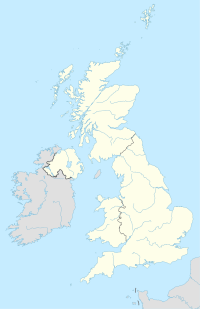Darwen
Darwen is a small town in the Unitary Authority Blackburn with Darwen in the north-west of England and has 36,326 inhabitants (2001). The city belongs to Lancashire .
The history of Darwen can be traced back to the time of the Anglo-Saxons . However, the modern history of Darwen only begins at the beginning of the 19th century with the construction of a road from Bolton to Blackburn in 1797 . This made it possible for the residents of the surrounding area to bring their goods to Darwen in order to sell them there. The growth of the city caused in this way was accelerated by the industrial revolution , especially by the settling textile industry . In 1907 there were 57 weaving mills and 8 cotton spinning mills in Derwen , as well as 10 paper mills . Today the textile industry has almost completely disappeared from Darwen. In 1877 the Borough of Darwen was formed, which in 1974 became the Borough of Blackburn.
Darwen is located in a narrow valley and is named after the river that rises south of the village. This river was first mentioned as derewent (river where the oaks grow) in 1208. The city is almost entirely surrounded by moors . In 1898 the Jubilee Tower was completed on the occasion of the 60th anniversary of Queen Victoria's throne . The tower, which is now mostly called Darwen Tower, stands on the top of the 401 m high Beacon Hill and has a height of 27 m. The people of Darwen are called Darreners . Visitors to the city include Mahatma Gandhi (1931), King George V (1913) and Queen Elisabeth (1968).
Personalities
- Neil Arthur (* 1958), singer of the pop duo Blancmange
